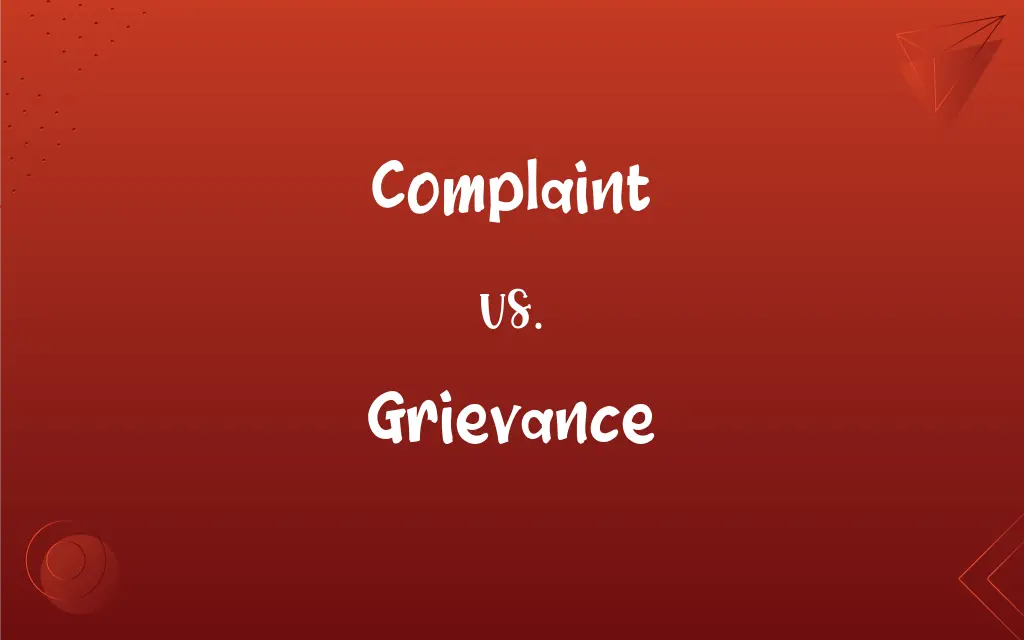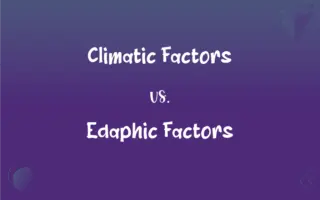Complaint vs. Grievance: What's the Difference?
Edited by Aimie Carlson || By Janet White || Published on February 6, 2024
Complain is an expression of dissatisfaction or problem. Grievance is a formal expression of wrong or injustice, often in a workplace setting.

Key Differences
Complaint typically refers to a specific issue or dissatisfaction in various contexts. Grievance often relates to a formal expression of injustice or unfair treatment, especially in employment.
Complaints can be casual and cover a wide range of issues. Grievances are usually more serious, indicating deeper issues like rights violations.
Complaints may or may not require formal investigation. Grievances often involve formal processes, especially in workplaces or institutions.
Complaints can be resolved quickly or informally. Grievances typically require systematic resolution through procedures.
Complaints are often about service or product issues. Grievances involve matters like discrimination, harassment, or labor disputes.
ADVERTISEMENT
Comparison Chart
Context
General dissatisfaction or issues
Formal issues of unfair treatment or injustice
Formality
Can be informal or formal
Usually formal, especially in workplaces
Resolution
Often quick or informal resolution
Requires systematic and formal resolution
Common Usage
Consumer services, everyday problems
Employment, legal rights, institutional policies
Severity
Can range from minor to serious
Typically serious and significant
ADVERTISEMENT
Complaint and Grievance Definitions
Complaint
A statement about a specific problem.
The customer's complaint was about late delivery.
Grievance
A complaint in a work or institutional setting.
Her grievance was related to workplace harassment.
Complaint
A grievance in a less formal context.
Her complaint about the restaurant service was noted.
Grievance
A formal expression of injustice.
The workers filed a grievance about unfair wages.
Complaint
An expression of dissatisfaction.
She filed a complaint about the noisy neighbors.
Grievance
An official statement of unfair treatment.
The union raised a grievance against the management.
Complaint
A report of a fault or defect.
His complaint was about the broken appliance.
Grievance
A serious complaint requiring formal resolution.
The grievance procedure was initiated due to policy violations.
Complaint
A formal allegation against something.
The complaint against the faulty product was filed yesterday.
Grievance
A concern about rights or benefits.
The employee's grievance was about the denial of benefits.
Complaint
An expression of pain, dissatisfaction, or resentment.
Grievance
An actual or supposed circumstance regarded as just cause for complaint.
Grievance
A complaint or protestation based on such a circumstance
The warden addressed the inmates' grievances.
FAQs
Can a complaint be informal?
Yes, complaints can be both informal and formal.
Is a grievance always related to work?
Commonly, but it can apply in other formal settings.
What constitutes a complaint?
An expression of dissatisfaction or problem.
How are complaints resolved?
Through direct communication or customer service.
What is an example of a grievance?
A formal complaint about workplace discrimination.
Can a complaint lead to legal action?
It can, depending on the severity and context.
What is a grievance?
A formal claim of unfair treatment or injustice.
What process resolves grievances?
Formal procedures within organizations or legal frameworks.
Who typically files a grievance?
Employees, union members, or individuals in institutional settings.
Who can file a complaint?
Any dissatisfied individual or customer.
Can anyone address a complaint?
Yes, typically by customer service or management.
Must grievances be substantiated?
Yes, typically with evidence or documentation.
How quickly are complaints addressed?
They can often be addressed quickly.
Can a grievance be positive?
No, it's inherently about negative experiences.
Are grievances legally binding?
They can be, especially in employment contracts.
What is the timeframe for resolving grievances?
It varies but usually follows a formal timeline.
What is an example of a common complaint?
Complaints about product quality or service.
Do complaints require proof?
Not always, especially for minor issues.
Who addresses grievances?
HR departments, legal teams, or grievance committees.
Are complaints always negative?
Yes, they express dissatisfaction.
About Author
Written by
Janet WhiteJanet White has been an esteemed writer and blogger for Difference Wiki. Holding a Master's degree in Science and Medical Journalism from the prestigious Boston University, she has consistently demonstrated her expertise and passion for her field. When she's not immersed in her work, Janet relishes her time exercising, delving into a good book, and cherishing moments with friends and family.
Edited by
Aimie CarlsonAimie Carlson, holding a master's degree in English literature, is a fervent English language enthusiast. She lends her writing talents to Difference Wiki, a prominent website that specializes in comparisons, offering readers insightful analyses that both captivate and inform.







































































